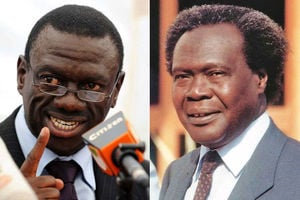
The Court of Appeal ruled that there were no constitutional violations and warned against using conservatory orders to bypass legal processes.
A Kilifi lawyer has been dealt a blow after the court dismissed his appeal to stop the Director of Public Prosecutions (DPP) from charging him with conspiracy to defraud an Israeli national.
The lawyer, Mr George Kithi, had asked the court to stop the DPP from charging him with conspiracy to defraud by obtaining millions of shillings from Israeli businessman Yehuda Sulami.
The appeal followed the High Court's refusal to grant an order stopping Mr Kithi's prosecution. Mr Kithi moved to the Malindi High Court in 2019, where he sued the DPP.
He explained that on August 27, 2018, he entered into a commercial investment funding agreement with Mr Sulami, an Israeli national, whereby US$300,000 (Sh38.79 million at current rates) was to be invested through him (Kithi).
The said money was to be disbursed within a period not exceeding 21 days.
The disbursement was secured by land plot no. Kilifi/Mtwapa/1058 owned by Mr Fred Tsofa Mweni and measuring 3.64 hectares.
Pursuant to this agreement, Mr Sulami registered a caveat on the title deed of the land and transfer documents were executed and deposited in his favour.
Court records show that the agreement provided that in the event of default in repayment, the security would be transferred to Mr Sulami, in whose favour the lawyer executed an undertaking; that pursuant thereto, Sh5 million was paid in cash and evidenced by an invoice from Munyithya Advocate for the Israeli national.
Court records further show that on August 31, 2018, Sh5 million was transferred from Mr Sulami's bank in Israel to Jamii Bora Bank.
"But there was a delay in clearing the same and the balance was never paid," Mr Kithi told the court.
According to the lawyer, he borrowed funds from other sources and proceeded with the transaction despite the effects of the delay caused by Mr Sulami's failure to utilise the funds on time.
“The said transaction was meant to mature sometime in early February 2019. As a result of the delay and breach, my ability to guarantee returns against the disbursed amount of Sh10 million within the stipulated 21 days was heavily compromised,” he said.
Consequently, the Sh10 million disbursed was not repaid to the Israeli national within the stipulated timelines.
Mr Kithi said that due to the pressure from Mr Sulami for the refund, he made a partial payment of Sh4 million to a company designated by the foreigner, Blueridge Capital Limited, on November 22, 2018 before the maturity of the transaction.
“Notwithstanding the foregoing, Mr Sulami employed the services of the DPP to help in the recovery of the said money by levelling criminal charges against me for conspiracy to defraud contrary to the law,” he said.
According to the advocate, the charges were trumped up and amounted to an abuse of the criminal justice process since it was merely intended to coerce him to pay the balance of Sh6 million.
He therefore sought orders from the High Court prohibiting the DPP from arresting, preferring charges against him or prosecuting him.
In response, the DPP through an affidavit filed by the investigating officer Mr Sammy Oyaro said upon conducting investigations, it was revealed that the foreigner gave the advocate money through the firm of Joseph Munyithya, on the undertaking that he would repay the same in 21 days.
“Upon realising that the money had not been paid into his account, Mr Mweni reported the matter to Central Police Station, Nairobi, admitting that he had given his title document to the advocate and at the same time reporting the loss of the said title,” said the officer.
Mr Oyaro told the court that upon being summoned by the DCIO, Kilifi, the advocate promised to repay Mr Sulami within a week but he did not honour that promise.
He said he concluded investigations and forwarded the file to the DPP for advice, and that it was recommended that the advocate be charged.
The investigator said that the charges were consequently preferred against the advocate at Shanzu courts in Criminal Case No. 56 of 2019.
The officer said the advocate was arrested and released pending his court appearance on January 14, 2019.
“But instead of appearing in court, Mr Kithi commenced legal proceedings against the DPP. The decision to charge Mr Kithi was neither actuated by malice nor an abuse of the process, but was based on sound evidence, facts and the law,” said Mr Oyaro.
When the High Court heard his application for conservatory orders, it declined to grant the same, arguing that Mr Kithi raised no serious issues for the court to exercise its discretion to appropriately grant a conservatory order against the DPP.
Justice Reuben Nyakundi who heard this application ruled that it was not proved at that interlocutory stage that the criminal process was tainted with illegality or irregularity that could give rise to a breach of a constitutional right in order to justify the grant of the conservatory order sought.
The Court of Appeal, where Mr Kithi challenged the High Court’s decision, reached the same conclusion, noting that they were satisfied that the judge considered all the relevant matters and did not consider any irrelevant matters that he ought not to have considered and dismissed the appeal.
The Court of Appeal has warned that people should not turn to the courts to bypass legally established procedures merely because it may cause them some inconvenience.
Three appellate Judges Kibaya Laibuta, Lydia Achode and Vincent Odunga argue that where a decision is made to prosecute a person, there are in place constitutional and statutory safeguards that ensure that an accused person gets a fair trial.
“A petitioner ought not to seek conservatory orders in order to evade the legally established process merely because it may cause some inconvenience to him,” said the judges.
However, they assert that this does not imply that, in every instance, conservatory orders should not be issued in a criminal process.
The judges have observed that in deserving cases, where there are serious allegations of violations of a person’s rights and fundamental freedoms or threats to such violations, the court may contemplate granting appropriate relief, especially when continuing with the trial could render the petition merely academic.
“Each case will, however, depend on its own facts and, where the trial court has exercised its discretion, this court will not interfere unless the above principles are satisfied,” they said.
The judges argued that where the conservatory orders sought to have the effect of derailing the investigative and prosecutorial authorities from carrying out their constitutional and statutory mandate, the court should be reluctant to grant such orders unless the petitioner satisfies the court that what is intended to be carried out and his own apprehension cannot appropriately be dealt with in the available forum.
They added that in the case of investigations, the right is available to the petitioner to present his own version of the accusations made against him.
“By stopping the investigating agencies from carrying out their mandate, the court would in effect be disentitling the petitioner from putting forward his case before the investigative agencies for consideration,” said the judges.






